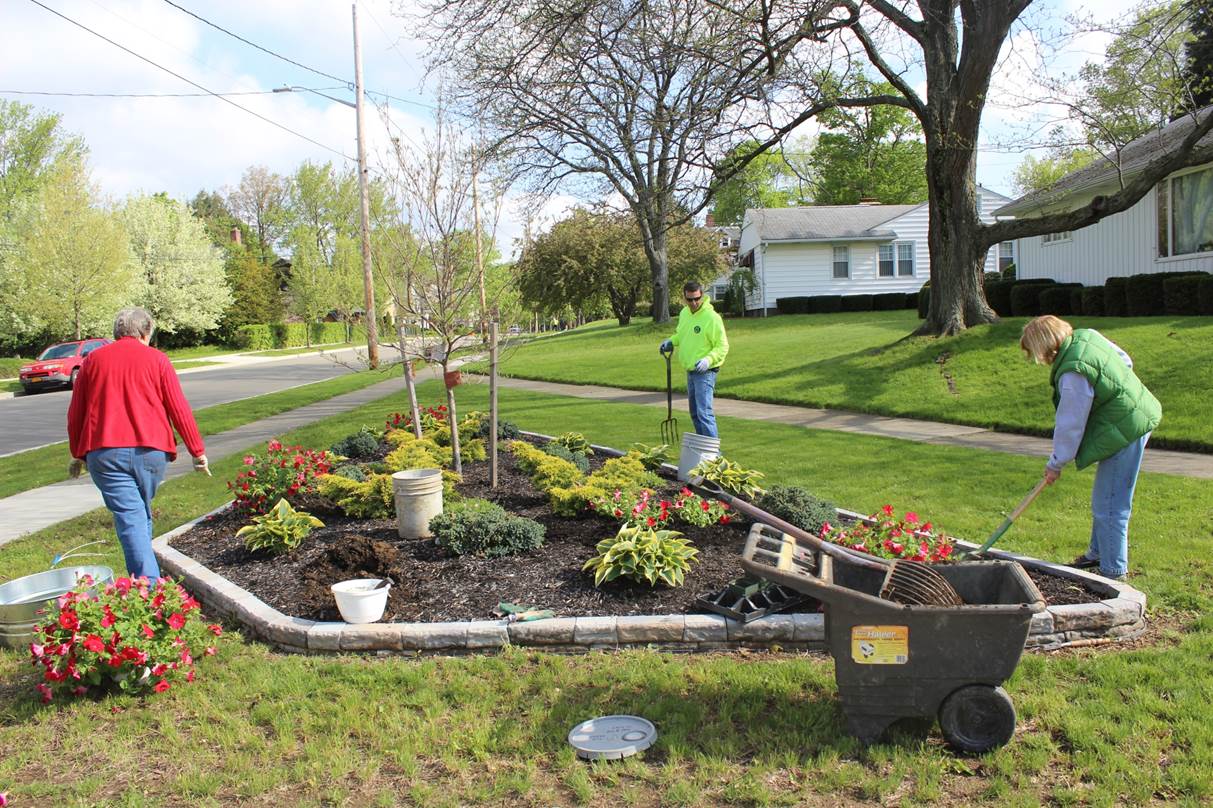
Garden bed at corner of Lakeview and Newton, a beautification project initiated by Lakeview neighbors (in collaboration with the City and JRC) in 2013.
If you call someone in Jamestown a politician, you’re likely to see them recoil in disgust or ball up their fists as if an epithet has been hurled in their direction.
But we’re all politicians. We all try to influence those around us in ways that will achieve civic or personal goals. We all find ourselves in positions where we seek to persuade others to follow a particular vision of the present or future.
In fact, politics is intrinsic to human nature and fundamental to how cities work. That’s why “politics” and “policy” are derived from polis, the Greek word for “city.” As innovators of the urban form, the ancient Greeks understood that decision-making by engaged citizens through logic and persuasion was one of the keys to having people live in close proximity without killing each other – and the critical enabler of a free and prosperous society.
This can be observed at many different levels. When you tell your upstairs neighbor to turn down their music in a manner that will achieve peace and quiet while avoiding hostility and retribution, you’re being politically adept.
When you bring some chocolate chip cookies to the young couple that recently moved in next door, you’re being welcoming and friendly – but you’re also establishing diplomatic ties and a line of communication in case anything goes awry.
When you offer some extra tulip bulbs to the neighbor across the street, you’re making a friendly gesture as well as signaling that well-kept yards are an important custom on your block.
This form of politics at the ultra-local level is alive, well, and gaining new energy in Jamestown. One of the clearest reflections of this energy is the level of participation in this year’s Renaissance Block Challenge, a program of the Jamestown Renaissance Corporation that provides small matching grants for exterior home improvements to groups of at least five neighboring property owners. It all starts when a neighbor takes it upon themselves to knock on doors, explain the program, and round up support for a collective approach to neighborhood improvement.
In 2011, the first year of the program, four applications were received with a total of 29 interested property owners. Last year, that grew to 12 applications with 149 interested properties. When final applications for the 2015 round of the program were due on April 2, the JRC received 35 applications with 446 interested properties.
The response has been tremendous. And deciding which blocks will be named this year’s Renaissance Blocks will be difficult from among such a large and promising pool. But the response indicates something very positive about a growing culture of civic leadership, because every one of those 35 applications has a leader or two behind it who summoned the courage to talk to their neighbors, share a positive vision of the future, and secure cooperation from a combination of friends, acquaintances, and strangers.
This bucks a trend of dwindling engagement, of uncontested local elections, of sparsely attended public meetings, of an attitude that sees politics as something that only certain people do. It’s an attitude that may have been rooted in Jamestown’s history as a hierarchical factory town, where a relative handful of people made most of the decisions and met the needs of the greater public.
Over time, a culture developed where most people saw civic improvement as someone else’s responsibility. “They should fix this” and “they should do that” replaced an attitude of more active engagement. Just sit back and wait for the mysterious “they” to do something.
But this new class of neighborhood leaders, who vary by gender, age, and life experience, demonstrates that this former mindset is beginning to dissipate. They’re turning the “they” into “we” – especially when it comes to their neighborhoods. And the ripple effect from this change is unlikely to end there.
–Peter Lombardi
This post originally appeared in The Post-Journal on April 6, 2015, as the JRC’s biweekly Renaissance Reflections feature.
